
Ever wondered what Shakespeare’s Sonnet 18 really means and how it is organized? In this article,
- You’ll see how Sonnet 18 is structured – in fascinating detail
- You’ll discover what Shakespeare really means
- You’ll get plenty of ideas for writing about Sonnet 18
Now, let’s dive into a detailed analysis of the sonnet.
Part 1 – Main Structure
Sonnet 18 by William Shakespeare
- Shall I compare thee to a summer’s day?
- Thou art more lovely and more temperate:
- Rough winds do shake the darling buds of May,
- And summer’s lease hath all too short a date;
- Sometime too hot the eye of heaven shines,
- And often is his gold complexion dimm’d;
- And every fair from fair sometime declines,
- By chance or nature’s changing course untrimm’d;
- But thy eternal summer shall not fade,
- Nor lose possession of that fair thou ow’st;
- Nor shall death brag thou wander’st in his shade,
- When in eternal lines to time thou grow’st:
- So long as men can breathe or eyes can see,
- So long lives this, and this gives life to thee.
(source: The Poetry Foundation)
Let’s Do the Big Picture Analysis
An analysis is really identifying the parts of something and the relationship between the parts. And that’s how you comprehend a piece of writing, such as a poem.
First, I want to show you how comprehension really works. In other words, how do you really read a sonnet, a poem, or any piece of writing, so that you would actually understand its meaning?
To make this really simple and easy, I came up with the idea of the Comprehension Pyramid. Here’s what it looks like:
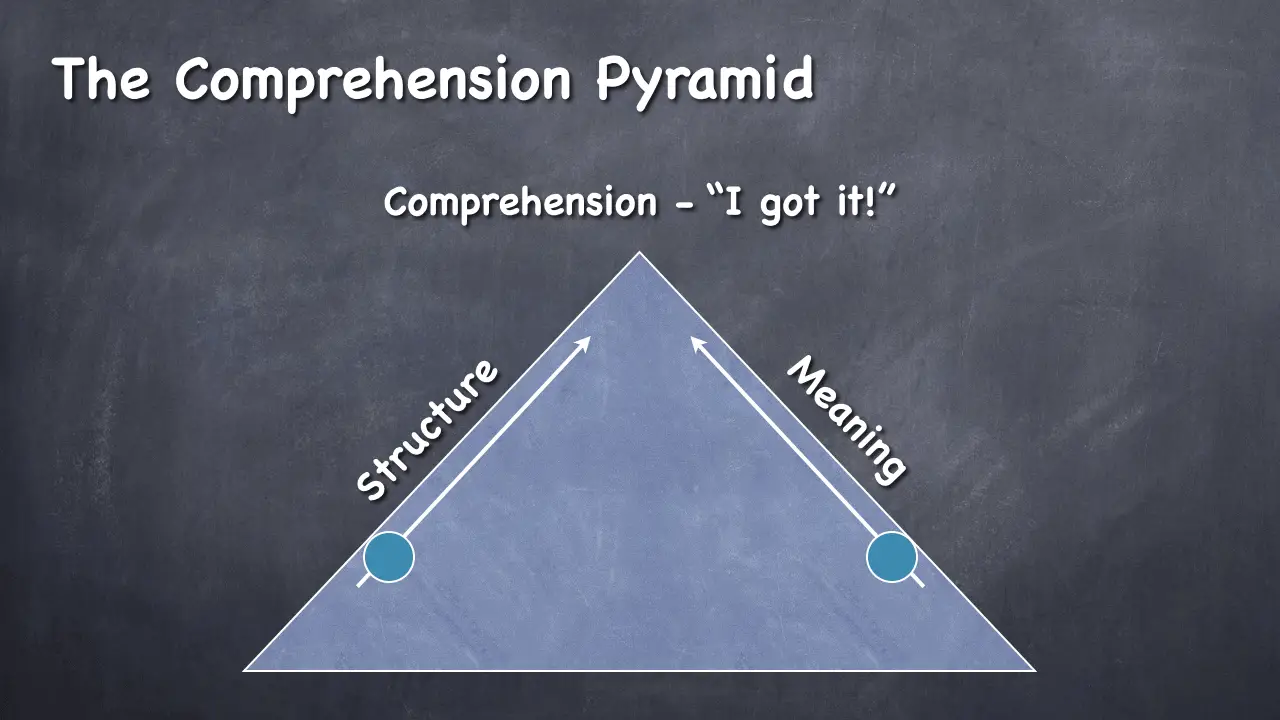
It’s very simple. The better you understand the structure, the easier it will be to understand the meaning of any piece of writing.
So, in the diagram above, as you climb the pyramid along the left ridge (structure), the meaning climbs with you on the right. And then you meet at the top, and you exclaim, “I got it!”
All you really need to do to understand something is to identify its parts and the relationship among them.
To analyze Sonnet 18, you need to ask yourself these two questions repeatedly:
- What are the parts?
- What is the relationship between the parts?
You can learn this process in this video:
How Is Sonnet 18 Structured?
First, let’s get some vocabulary out of the way.
In line 1, the word “thee” simply means “you.”
In line 2, the word “thou” also simply means “you.”
And in Line 9, ”thy” means “your” or “yours.”
Let’s take a look at lines 1 and 2
1. “Shall I compare thee to a summer’s day?
2. Thou art more lovely and more temperate:”
In Line 1, Shakespeare tells you exactly what he intends to accomplish in this sonnet. He wants to compare “thee,” meaning “you,” to a summer’s day (or to the summer).
This already gives you a hint that there could be two parts to this sonnet.
In line 2, he states the contrast: “You are more lovely and more temperate” than the summer.
As a result, lines 1 and 2 contain the argument, much like an argumentative essay.
In fact, this sonnet works like a perfect college-level essay. You state the thesis in the first paragraph and then support it in the body of the essay. This is exactly what Shakespeare does in this sonnet.
Shakespeare is about to compare “you” to the summer, and that’s perfectly clear right from the beginning.
Now, since Shakespeare just told us that he wants to do a comparison, we can start looking for the main structure.
In other words, we should look for what parts of the sonnet Shakespeare devotes to “you” and what parts to “the summer.”
Hint: Look for Key Power Words
To identify the main parts of the sonnet, we should look for some of the key words.
These are words like “and” or “but” and their variations, such as “also” and “however.”
And we find our main key word “But” in line 9.
The word “But” separates the two main sections of this sonnet. The first one is about “you,” and the other one is about “the summer.”
Shakespeare Structures this Sonnet Perfectly
Lines 3 to 8 are about the “summer.” And lines 9 to 14 are about ”you.”
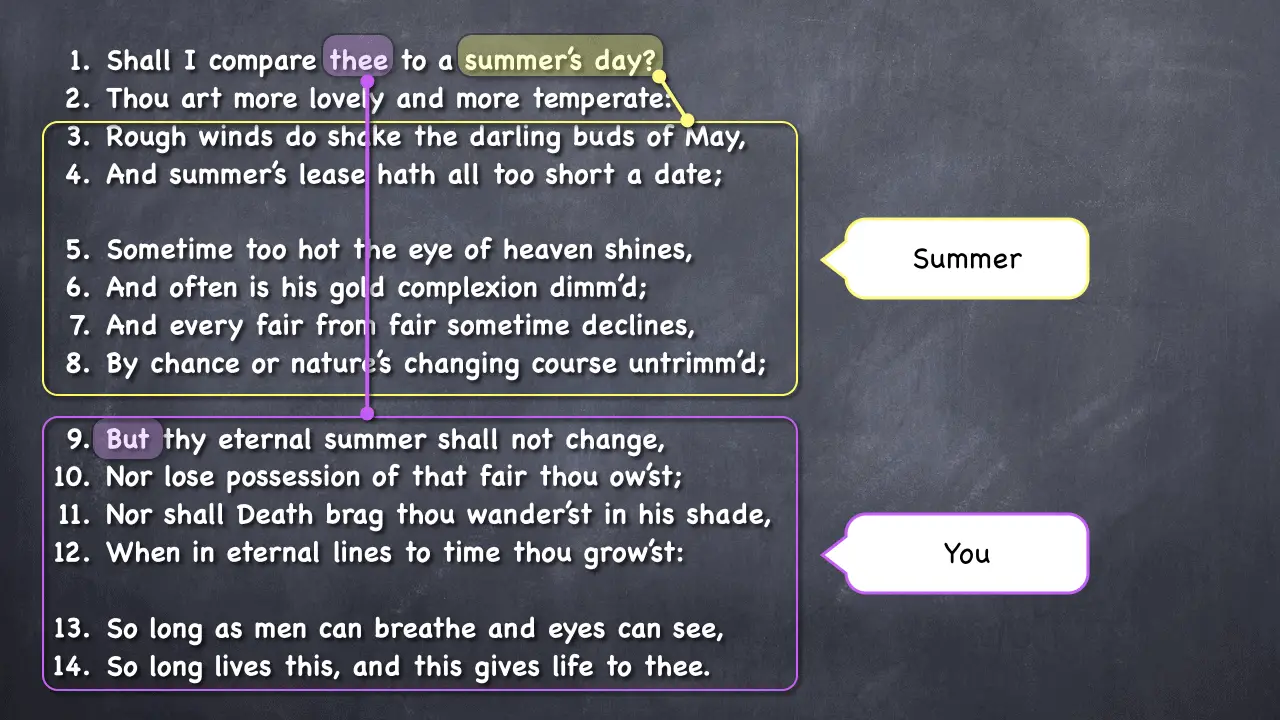
Note that this structure is in perfect accordance with line 1 which essentially states: “I’m comparing you to the summer.”
When I teach essay writing, this is how I teach my students to write. State your argument upfront in the beginning, and then structure the body of the essay accordingly.
Good job, Shakespeare!
Part 2 – How Does Shakespeare Accomplish the Comparison?
We know that Shakespeare is about to compare you to the summer. But do we have even more information in the first two lines?
Yes, we do. In line 2, Shakespeare gives us two criteria on which he wants to compare you with the summer.
And what are the criteria? In line 2, he says “You are more lovely and you are more temperate.”
And “temperate” just means “mild,” or “not extreme.”
And so the criteria are loveliness and mildness.
Now we need to read the rest of the sonnet to see if Shakespeare really uses these two criteria to do the comparison. Here’s a video where I do this line by line:
If we go through the entire sonnet, we’ll see that only lines 3, 5, and 6 are about loveliness and mildness. The rest of the lines are about something else.
Let’s take a look
3. Rough winds do shake the darling buds of May,
This line is about mildness. How do we know that?
We know that because the winds are “rough,” and “rough” is the opposite of “mild.” In other words, compared to you, May is rough. And you, therefore, are milder.
And May, of course, represents the summer.
See how this works?
4. And summer’s lease hath all too short a date; (we’ll come back to this line…)
5. Sometime too hot the eye of heaven shines,
This line is also about mildness. How do we know that?
We know that because the sun (the eye of heaven) is “too hot.” In other words, it’s extreme, it is not mild. And in comparison, you are milder.
So, we’ve got two lines devoted to mildness so far.
6. And often is his gold complexion dimm’d;
This line is about loveliness. How do we know that?
We know that because the face of the sun becomes dim. And dim is low brightness, low energy. In other words, it is not lovely enough.
And in comparison, you are more lovely, just like Shakespeare stated in his argument in line 2 (see diagram below).
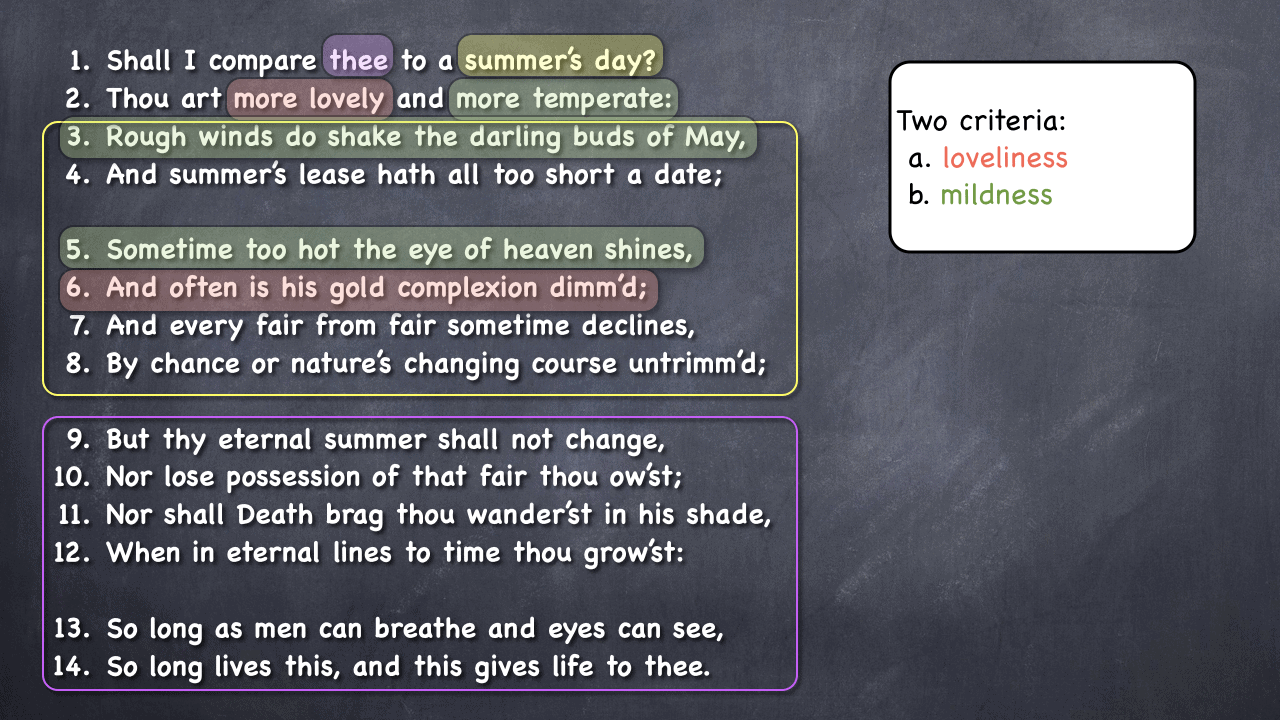
Thus far, we have identified in which lines Shakespeare actually supports his argument the way he stated it in the first two lines.
But What About the Rest of the Sonnet?
Great question. If Shakespeare is not talking about loveliness or mildness in the rest of the lines of the sonnet, then what IS he talking about?
Let’s take a look.
We know what’s happening in lines 1-2, 3, and 5-6.
1. Shall I compare thee to a summer’s day? (Argument)
2. Thou art more lovely and more temperate: (Two criteria)
3. Rough winds do shake the darling buds of May, (The summer is rough, unlike you)
4. And summer’s lease hath all too short a date;
5. Sometime too hot the eye of heaven shines, (The summer is too hot, unlike you)
6. And often is his gold complexion dimm’d; (The summer is less lovely than you)
Now, what is going on in line 4?
4. And summer’s lease hath all too short a date;
This line has something to do with Time. Do you see that it has nothing to do with beauty or mildness? Nothing whatsoever.
Shakespeare’s complaint against the summer in line 4 is that it is too short. In other words, it lacks longevity.
And when we read the rest of the sonnet (lines 7-14), we realize that those lines are devoted to time. More precisely, they are about longevity.
7. And every fair from fair sometime declines, (Any beauty must fade away at some point)
8. By chance or nature’s changing course untrimm’d; (Because that’s how nature is)
9. But thy eternal summer shall not fade, (But your youth will NOT fade)
10. Nor lose possession of that fair thou ow’st; (It will not lose its beauty)
11. Nor shall death brag thou wander’st in his shade, (And Death will not take you)
12. When in eternal lines to time thou grow’st: (When time tries to claim you)
13. So long as men can breathe or eyes can see, (Because you shall forever)
14. So long lives this, and this gives life to thee. (Stay alive in this poem)
As it turns out, back in line 4 Shakespeare introduced a new criterion on which to compare you with the summer. And it is not loveliness or mildness. It has nothing to do with these concepts.
The third criterion is about Time. It is longevity.
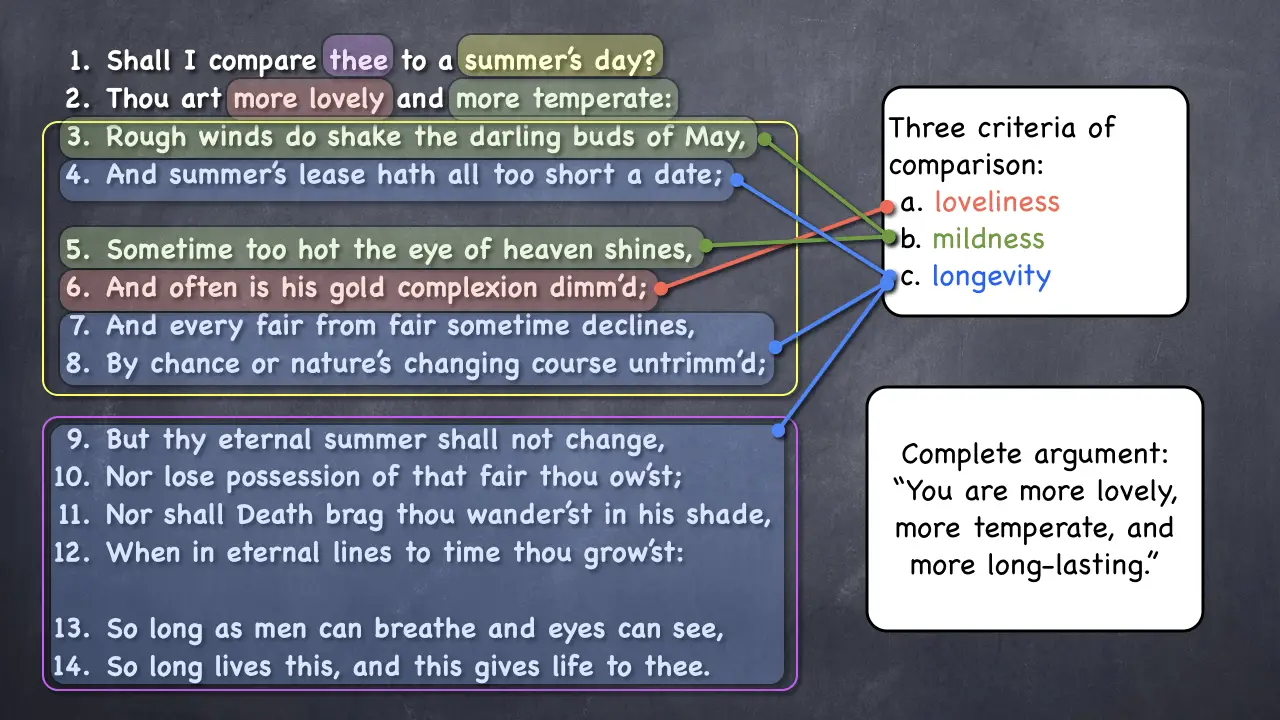
Your Takeaways So Far
- Shakespeare initially gives us two criteria on which to compare you with the summer in line 2.
- The criteria are Loveliness and Mildness. You are more lovely and more mild than the summer.
- However, in line 4, Shakespeare introduces a third criterion – Longevity. You are also more long-lasting, more durable than the summer.
- And the poet devotes lines 4 and 7-14 to supporting this point.
- As a result, you can say that the sonnet is mostly about Longevity because Shakespeare spends most of the time talking about it.
- We can summarize Shakespeare’s entire argument this way: You are more lovely, more mild, and more long-lasting than the summer.
How interesting is it that Shakespeare actually uses three criteria, not two! Very interesting.
And if we go back to our Comprehension Pyramid, as we were getting more clarity on the structure, we were also getting more clarity on the meaning.
We have reached the top, and now we can proudly say that we truly understand the meaning of this sonnet.
Part 3 – How Shakespeare Uses Words to Draw a Contrast
Shakespeare is not only a master of argumentation and rhetoric. As a poet, he is also a master of using words with impact.
He knows that once he put forth his argument, he has to support it. And in this sonnet, he must continually present a contrast.
This is the contrast between You and the Summer. How does Shakespeare use words to make a sharp and clear contrast?
Let’s take a look. (You may watch the video below for a video lesson)
In line 3, Shakespeare uses the word “rough” to describe the winds of May. And we immediately know that if the summer is “rough,” then You, in contrast, are mild.
Again, we’ll come back to line 4. (Poor line 4 🙂 )
In line 5, the sun is “too hot.” You see, if something is “too” something, that means it’s an excess. Too much of anything is bad. Shakespeare knows this and uses the word to bring the sun down, in implied comparison with you.
In line 6, the sun is “dimmed.” It’s dull, not beautiful. Compared to it, you are not dim or dull at all. That’s the implication.
In other words, Shakespeare doesn’t even have to mention You to make a point about You. All he has to do is criticize the summer. And it becomes clear that You are simply better (more beautiful and mild).
How Shakespeare Uses Juxtaposition
Let’s look at some of the pairs of opposites Shakespeare uses so masterfully.
He juxtaposes lines 7-8 with line 9. In lines 7-8, he uses the words “declines” and “changing.” They refer to the summer.
Decline and change are opposites of longevity and constancy. These words imply death.
In contrast, in line 9, Shakespeare uses the words “eternal” and “not change.” These refer to You. Do you see how cleverly the poet presents a contrast?
Eternal means forever. Not to change also means to last forever. Shakespeare endows You with longevity, durability, immortality (see diagram below).
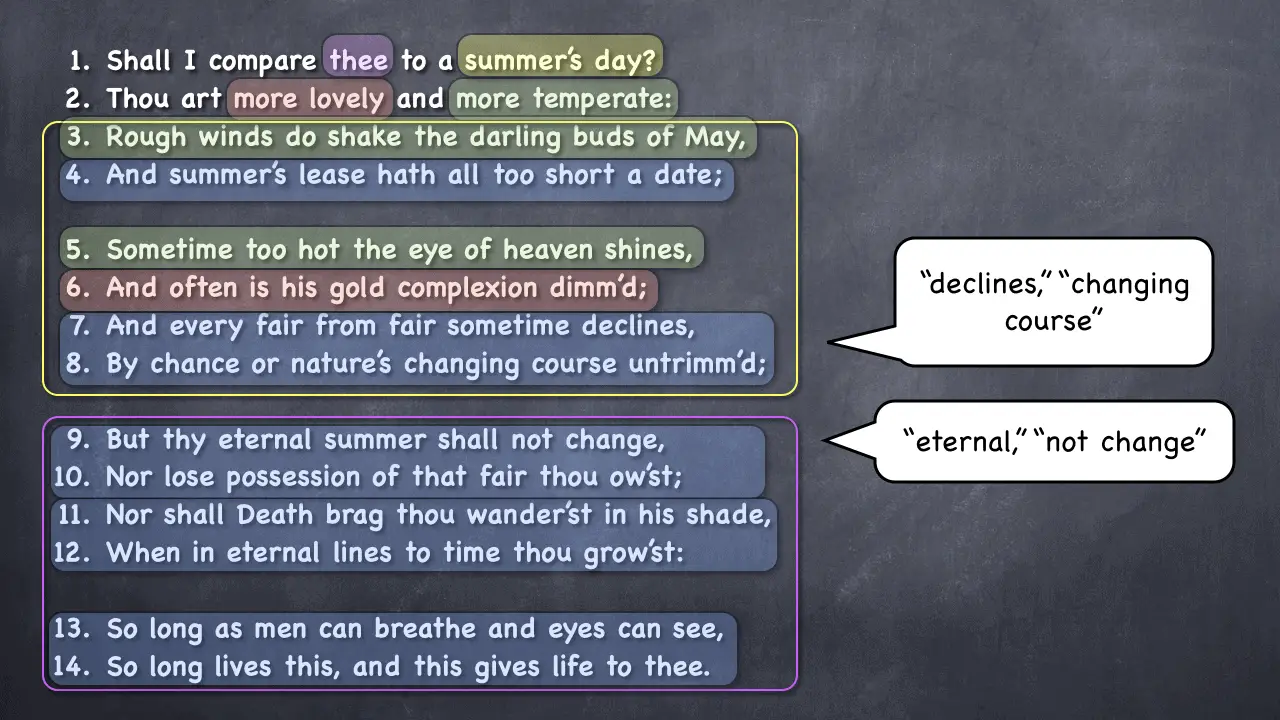
Now, it’s time to come back to line 4, where the poet uses the word “lease.” What is a lease? It is a rental contract. You pay to use something, and then you have to give it back.
Contrast this with “ow’st” which means “own” in line 10. What does it mean to own something? Do you have to give it back? No! It’s yours forever.
See how clever that is?
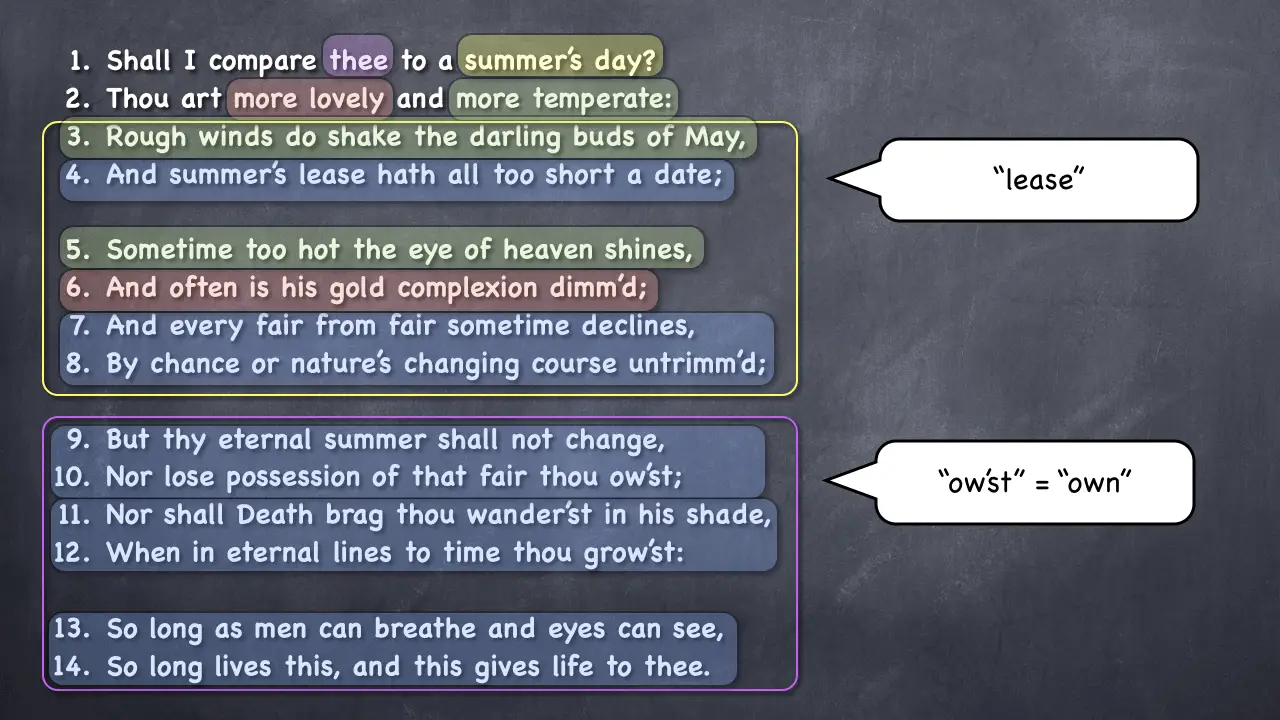
The Punchline
Lines 13 and 14 (the couplet) are the punchline of the sonnet. Please note that section two (lines 9-14) is entirely devoted to the third criterion (Longevity).
In the last two lines of the sonnet, Shakespeare explains why You are more long-lasting than the Summer.
It’s for a very simple reason. Because for as long as men can breathe, for as long as people can come to this poem and read it, you are alive in it.
Essentially, this poem makes you eternal. It makes you immortal.
